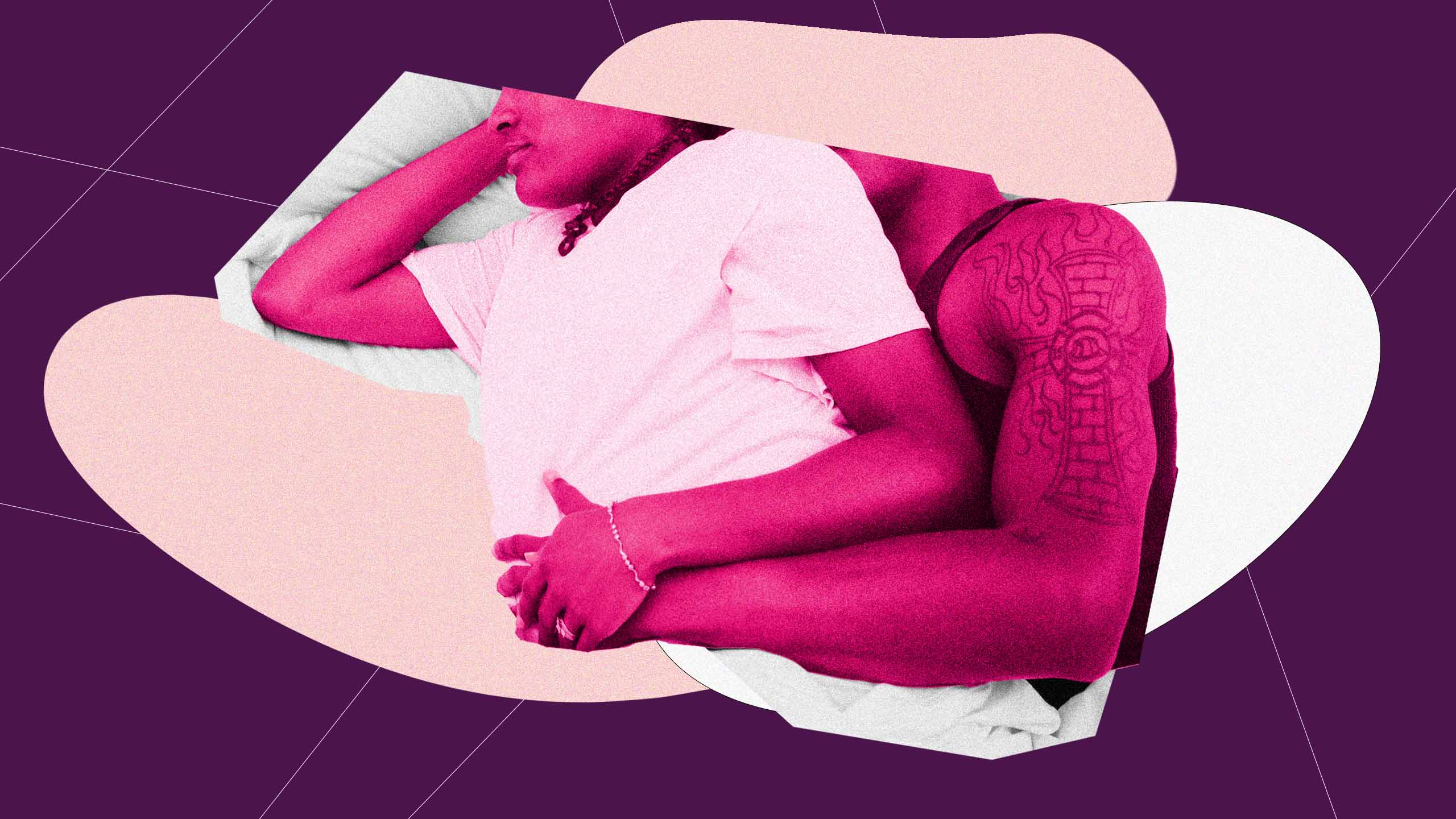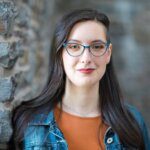One evening in 2013, my boyfriend and I were squished together on the twin-size bed in my dorm room. With my back toward him, I settled into the heat of his body and the quiet of the moment. He reached between my legs.
“I thought we were cuddling,” I said.
“We are cuddling,” my boyfriend said, either oblivious to my discomfort, or uncaring.
My chest tightened. We’d slept together before, but I didn’t feel any sexual desire that night, and I wanted to be held without the assumption it might lead to foreplay. This situation had come up before, and I never quite knew how to navigate it. I didn’t know how to tell someone I loved that I didn’t want to have sex with them, so I usually gave in to pressure.
For most of my twenties, I identified as bisexual and went through the motions of adult relationships. I felt emotional and romantic attraction to my partners, and having sex seemed the best way to maintain my connections to those people—even on days when I had no desire for sexual contact. Despite my fluctuating desire, sometimes I genuinely did enjoy having sex. As a result, the idea that I may be asexual never crossed my mind.
Then, two years ago, at age 28, I was diagnosed with autism. The day I was diagnosed I felt extreme relief: my lifetime of feeling like an outsider finally had an explanation. This realization lit a fire under me—I wanted to live as my authentic self. Although I’d come out as bi almost a decade before, I still suspected there was even more to my identity. Over the following two years, I learned about the complexities of asexuality, thanks in part to Angela Chen’s book Ace. After reading the book, I reflected on what I’d learned and how it might apply to my own life. By that point I was married, and eventually I talked the subject over with my partner as well.
I looked up various identities under the asexual umbrella, wondering exactly where I fit, but one simple answer felt true: I was asexual, or ace.
Terms to know
Asexual: A person who has little or no interest in sexual contact. Asexuality exists on a spectrum. A person who is asexual may or may not experience romantic attraction, for example.
Demisexual: An identity under the asexual umbrella. Demisexuals typically do not feel sexual attraction upon meeting someone new, but attraction may develop alongside an emotional connection.
Allistic: A term used to describe people who are not autistic.
Compared to my autism diagnosis, coming to terms with being ace was much scarier. First off, I worried about how it might affect my marriage—thankfully, after talking things over, my partner reassured me. I also wondered though if, by coming out as asexual, I would reinforce harmful and enduring assumptions about autistic people—through my research on autism, I had come upon dozens of autistic writers and creators who pushed back against the idea that autistic people must be inherently asexual. Not wanting to contribute to that narrative, I considered that perhaps I owed it to my peers to keep quiet about this side of me.
Desexualization is something that starts early in life for autistic people, says Wendela Whitcomb Marsh, autism specialist and author of the books Dating While Autistic and Relating While Autistic.
As their kids reach adolescence or adulthood, “some autism parents maybe hope that their children are asexual,” says Whitcomb Marsh, “because it’s easier for those parents not to think about [their child being interested in sex]. It’s unfortunate that they have blinders on, but that’s one attitude.” Physically disabled folks, often painted as sexless and childlike, must contend with these stereotypes as well.
Chris Muise, 36, says he has been dealing with these stereotypes for years. He was diagnosed with autism at 15—around the same time he became interested in dating. He didn’t think much of his new diagnosis at first, as he’d already experienced multiple health issues, including a vascular disease that required regular medical appointments.
During one of these appointments, Muise mentioned he’d started seeing his first girlfriend. The doctor was surprised and said he didn’t think autistic people were interested in relationships.
“I got that misconception real early,” says Muise, laughing. “It was him saying that, that made me go, ‘Am I gonna have trouble dating?’”
Muise, who is straight, did eventually determine that he is demisexual. People who are demisexual exist on the ace spectrum, and don’t typically experience sexual attraction when they first meet someone. However, that attraction may develop once they have formed an emotional connection to a person.
Muise notes that the nuances of his sexuality have impacted his dating life. He doesn’t think his demisexuality is a direct result of his autism, but, he says, “I can see how one influences the other.” His sensory issues can make some aspects of physical intimacy overwhelming, for instance.
Jay Butler, 32, says they’ve also noticed parallels between their autism and their asexual identity. “Sex has never really been something I’ve been interested in as an act,” says Butler. “I thought for a long time that I was just weird.”
Butler learned about asexuality around the same time they were coming to terms with being trans.
“It was almost like a gate that opened for me,” says Butler. They now identify as demisexual and bi.
Butler says they notice a lack of nuance when it comes to how people talk about asexuality. People tend to assume all asexual people are completely sex-averse, for example, when that’s not always true.
“There’s a very narrow viewpoint for such a wide range of people,” they say. “Every ace person is different, just like every bi person is different and every gay person is different.”
For Butler, their autism and sexuality mirror each other in several ways. Like many autistic people, Butler tends to camouflage or “mask” their autistic traits around people they don’t know or trust. Just as a certain comfort level is required for them to unmask, just as a certain level of comfort is required before they can feel sexual attraction.
“I wouldn’t be able to pull them apart in any way. It’s totally linked,” says Butler.
In fact, the more I learn, the more I notice social parallels between asexuality and autism. Both are spoken of as a spectrum, and both—despite a recent increase in awareness—are still largely misunderstood.
Evidence suggests autistic people are more likely to identify as queer or trans than their allistic peers. However, there’s not a definite answer as to why such an intersection exists. There is also little in-depth research on autism and asexuality in particular. One study cautions against correlating the two, given how the study’s subjects had various definitions of asexuality.
Historically, asexual folks have been pathologized, and their sexualities have been seen as problems to be solved. Whether due to the decades-old label of “frigid” or the diagnosis of hypoactive sexual desire disorder, it would have been difficult for anyone to freely identify as part of the ace spectrum until recently. (The DSM still includes female sexual interest-arousal disorder and male hypoactive sexual desire disorder, but as of 2013, it also acknowledges asexuality as an identity rather than an illness.)
Autistic people have similarly been pathologized unnecessarily, and controversial therapies like Applied Behaviour Analysis have long been used to help them “fit in” with allistic people, sometimes to the detriment of the patient.
Both autism and asexuality challenge what our patriarchal, ableist society deems acceptable. There has been recent hand-wringing about rising rates of autism diagnoses and about the fact that young people are reporting having less sex. This panic around the increase in autism diagnoses is driven by fear, and I can’t help but feel the headlines bemoaning a “sexless generation” are as well.
The more I speak with my autistic peers, the more I realize I wasn’t helping anyone by keeping one foot in the closet. Disabled people aren’t a monolith. We have individual experiences and sexual identities—including asexuality. For most of my life, I expended too much energy clamping down aspects of my identity and personality. When I opened up about autism, I wanted to be truer to myself. I eventually realized that embracing my asexuality was no different.
Sex, for me, has never been a result of sexual attraction. Sometimes it’s been about love, sure—but not always.
I no longer want to be that woman in the university dorm, conceding to sex, just as I no longer want to bite my tongue or sit on my hands to hide my autistic traits. I wish I could say I’ve left that frightened version of myself in the dust, but I haven’t. I’m still figuring it out.
If we are to embrace ace and autistic identities as normal, or at least common, we have a lot of work ahead of us. For some, that is a terrifying idea indeed.
Personally? It fills me with hope.


 Why you can trust Xtra
Why you can trust Xtra


